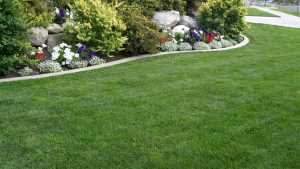For a variety of reasons, including weed management, disease prevention, nutrient and water absorption, microbial activity stimulation, and more, maintaining the right ground temperature is important for your grass. Regular watering and mowing are insufficient to maintain a healthy and vibrant grass. Understanding the significance of appropriate ground temperature is one part of lawn maintenance that is sometimes disregarded.
The development and general health of your lawn are greatly influenced by the ground temperature. This article will examine the significance of ground temperature and how it influences the growth of grass, the health of the root system, and the general beauty of your lawn.
Take-Up of Nutrients
The right ground temperature is essential for your lawn to properly absorb nutrients. The roots of your grass can efficiently absorb vital nutrients from the soil when the ground temperature is within the ideal range. Your grass needs nutrients like nitrogen, phosphorus, and potassium to thrive, turn green, and stay healthy overall.
An ideal ground temperature encourages root hair activity, which is what allows plants to absorb nutrients. These root hairs work best in a particular temperature range, effectively absorbing nutrients and transporting them to other areas of the plant.
However, an insufficient ground temperature might obstruct the uptake of nutrients and cause shortages in your grass. The effectiveness of nutrient absorption decreases when the ground temperature is too low, causing the root activity to slow down. This may lead to nutrient deficits and thin, pale grass as a result.
On the other hand, an abnormally high ground temperature can have an impact on nutrient uptake. Heat stress can harm roots and impair their capacity to adequately absorb nutrients. This can have a negative effect on your lawn’s health and look by causing nutrient imbalances.
Water Solubility
The grassroots’ ability to absorb water and absorb nutrients depends on the ground’s temperature. The roots become less active when the ground temperature is too low, which affects how well they can absorb water. This could lead to water waste and ineffective irrigation, resulting in dry spots on your grass and runoff of water.
Inadequate ground temperature might also make it difficult for water to percolate through the soil. The soil may become more compacted in colder weather, forming barriers that stop water from penetrating deeply. Due to weak root development and restricted moisture access, the grass may become more susceptible to drought stress.
The proper ground temperature must be maintained for the lawn to receive and distribute water as efficiently as possible. The roots have easy access to the water they require for development and growth. A balanced ground temperature also aids in the prevention of water waste and permits optimal irrigation techniques, lowering the risk of dry patches and encouraging healthy, well-hydrated grass.
Microbes at Work
In addition to having an effect on grass growth, the ground temperature has a big impact on the activity of good soil microorganisms. These microbes, which also include fungi and bacteria, are crucial for preserving a balanced soil ecology.
An ideal ground temperature encourages the development and activity of advantageous soil microorganisms. These microbes convert organic materials, such as grass clippings and dead plant matter, into nutrients that are easily accessible to the grassroots. They are critical to nutrient cycling because they return important minerals like potassium, phosphorus, and nitrogen to the soil. This nutrient-recycling procedure increases the soil’s general fertility and gives the grass a constant supply of essential nutrients.
Additionally, advantageous soil microorganisms aid in the suppression of pathogens that might impair the health of your grass. They combat disease-causing organisms and stop their growth, lowering the possibility of bacterial or fungal infections. This lessens the need for chemical treatments and helps to create a lawn that is resistant to disease.
Control of Weeds
Another significant factor that is affected by the right ground temperature is weed control. When conditions are adverse for grass development, such as when the ground temperature is too hot or too cold, weeds frequently thrive. You can prevent weed growth and invasion by maintaining the ideal ground temperature for the variety of grass you are growing.
Cool-season grasses may suffer, resulting in thinning and decreased growth, if the ground temperature is too high. Weeds now have the opportunity to establish themselves in exposed or weak spots. Similar to how warm-season grasses may go dormant or become less active when the ground is too cold, allowing cool-season weeds to flourish.
Maintaining the ideal ground temperature for your particular grass type encourages the growth of a strong, dense lawn. Weeds can’t compete with a strong, well-kept lawn nourished by the proper ground temperature for space, nutrients, and sunlight. The lush grass cover creates a competitive environment that hinders weed establishment and growth and aids in preventing weed seeds from germinating.
Health Promotion
An important factor in the development and spread of grass diseases is ground temperature. Maintaining the ideal ground temperature can help lower the danger of disease outbreaks and develop a disease-resistant lawn since many diseases have unique temperature preferences.
Conditions in the ground that are overly warm and wet are suitable for some diseases, like fungi infections. In warm, humid climates, fungus infections proliferate and cause diseases like brown patches or dollar spot.
You may decrease the conditions that encourage fungal growth and lower the danger of disease outbreaks by keeping an eye on and controlling the ground temperature, especially during times of high humidity. You may prevent the growth and spread of these diseases by keeping the ground temperature ideal for your particular grass species.
In conclusion, the health, look, and lifespan of your lawn depend on the correct ground temperature. It has an impact on microbial activity, water absorption, nutrient uptake, weed management, and disease prevention. By making sure the ground is at the proper temperature, you provide the ideal conditions for your grass to flourish and maintain a stunning and hardy lawn.
Hiring professionals for lawn maintenance ensures competence and effectiveness, saving you time and effort. Professional lawn weed control companies like Baton Rogue Landscape Pros have the skills, equipment, and experience necessary to tackle different lawn maintenance tasks, resulting in a well-kept and healthy lawn. Request more now!





